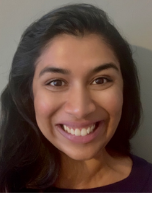Reflections from our first Biomedical Fellow
Jeeva John talks to Sarah Cunningham-Burley about her time with the Centre

Jeeva, we have really enjoyed your 6 month residency in CBSS, the perspectives you bring as an obstetric trainee, and supporting you in your project. Our intention with this residency programme is to enable those working in health care or biomedical science to undertake a project in the humanities and/or social sciences that both relates to their interests and CBSS's research themes. You were our inaugural fellow. Tell us what brought you to apply?
Thank you so much for an exciting, and fruitful six months. When I applied to the visiting scientist fellowship at CBSS, I was at a point in my Obstetrics and Gynaecology specialist training where I was eager to explore my interests in health equality and equity, particularly in maternal outcomes. I have always believed in the value of cross-disciplinary engagement and research, and really felt that the opportunity to work with social scientists and humanities researchers to address this important disparity in health outcomes was an incredible chance to broaden my own horizons, and to get different perspectives on something I only knew of as a clinical problem until then. I also would have been highly unlikely to have an opportunity to engage in a project like this without this fellowship.
You conducted both a systematic review and an exploratory qualitative study exploring Black and Minority Ethnic women's experiences of maternity care. How did you find conducting qualitative interviews and what did you learn from the method?
Having never conducted a systematic review or been involved in qualitative research before, this definitely was a daunting process, however I could not have asked for better support and guidance from the CBSS team in order to complete these projects, even in a purely virtual environment! Although it seemed implausible at times in this short time frame, I was able to write a research proposal for the qualitative study, navigate the arduous process of ethics approvals, recruit participants for interviews during lockdown, conduct the interviews myself over the telephone, analysis a huge amount of rich data, and finally write it all up in a legible paper! Even though as an Obstetrics & Gynaecology registrar, I had plenty of experience taking focussed histories from patients, semi-structured qualitative telephone interviews were not something I had any prior experience of. Again, I would like to thank the CBSS team, and the University of Edinburgh courses that were made available to me that helped me to develop the specific skills required to conduct effective qualitative interviews. I am very grateful to have had this experience, and feel that I gained a lot from it. I have learned new, and helpful techniques to derive rich information even in the context of difficult conversations, especially when all the interviews were over the telephone, where traditional non-verbal cues were absent. These are skills that are transferable to my clinical practice, and also in ongoing research that I hope to undertake.
It must have been hard to become acquainted with the different academic language of the humanities and social sciences as you attended and participated in our seminars and meetings. How did that feel and what have you taken away from the perspectives that these disciplines bring to understanding health, illness and health care?
Yes, absolutely, I remember distinctly, one of the first Thursday seminars I attended right after I started, and it felt like everyone was speaking in a completely different language, entirely unknown to me!! What I would like to stress though is that despite the apparent differences in clinical and humanities/ social sciences academia, because everyone at CBSS is so welcoming and friendly, I never felt like I was asking silly questions (even though I probably was)! Again, these seminars were a huge resource of cross-disciplinary knowledge, novel ways of thinking, and transferable skills. I believe that the state of health goes beyond the absence of disease, and encompasses social structures, cultural aspects, health policies and governance, and much more. The opportunity to engage with experts in bioethics, law, global health governance, sociology, and medical history during my CBSS fellowship has helped me develop a greater understanding of illness, and the role of a clinician beyond treating it.
Lastly, congratulations on achieving so much during this six months especially given the pandemic restrictions. We have certainly felt you have been part of our academic community of this time. Given your experience, what advice would you give to any future clinician/scientist fellow who might wish to join us?
Thank you again for a wonderful fellowship, and the incredible opportunity to work with such a vibrant academic community. I can concur that I have also felt very much part of the CBSS community, and am thankful for everyone’s patience and warmth in welcoming me, especially during an unprecedented, and very stressful pandemic!
To anyone thinking of applying for a CBSS visiting scientist fellowship, I would say- go for it! I have gained so much more than I expected in such a short period of time, and I would recommended CBSS as a highly supportive centre, who are encouraging and inspirational. If you are a driven individual who is looking to do something a bit different, and to learn a whole lot in the process, this fellowship is for you!

